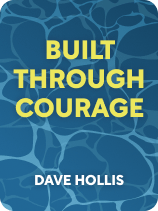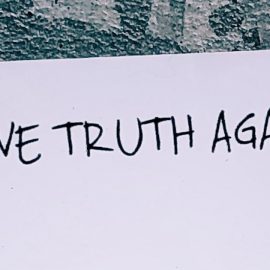

This article is an excerpt from the Shortform book guide to "Built Through Courage" by Dave Hollis. Shortform has the world's best summaries and analyses of books you should be reading.
Like this article? Sign up for a free trial here.
What’s the purpose of examining your life? Do your current circumstances reflect your goals?
Making changes in your life doesn’t just happen overnight. It takes time to reflect on your behaviors and habits that need to be transformed in order to become the best version of yourself.
Let’s look at how to examine your life to make some great improvements, as advised in Built Through Courage by Dave Hollis.
Understand Your Current Circumstances
To fulfill your purpose, you must first examine your life, Hollis says. Since your previous actions weren’t helping you achieve your purpose, you’ll have to change certain aspects of your life and behavior to better fit this goal. To make these changes, you must first understand what you’re changing, how you arrived at your current circumstances, and why you don’t want to remain in that state.
(Shortform note: When reflecting on how you arrived at your current circumstances, consider following Dale Carnegie’s advice in How to Stop Worrying and Start Living: Accept that you can’t change the past. Doing so will prevent you from ruminating on the past, thus allowing you to focus on your present (understanding what you want to change and why) and your future (planning how to achieve your purpose). To further prevent yourself from ruminating on the past, consider reframing your past mistakes as learning opportunities, as Robin Sharma advises in Who Will Cry When You Die? For example, reflecting on your past workaholism and how it harmed your health can serve as a strong reminder to prioritize work-life balance as you strive to achieve your purpose.)
To understand your current circumstances, determine whether your environment supports or harms your efforts to achieve your purpose. This includes aspects of life like the people you surround yourself with and the media you consume.
| How Your Environment Influences You Your environment may affect your ability to achieve your purpose because of the way your brain absorbs information. In The Compound Effect, Darren Hardy says your environment provides a constant flow of information—for example, the habits of people around you or news of a natural disaster. You consume this information subconsciously and it affects how you think and behave. If your environment is full of influences that discourage you from changing, you’re more likely to remain stagnant. If your influences encourage you to grow as a person, though, you’ll want to change and it’ll be easier to achieve your purpose. For example, imagine you want to leave an unfulfilling job to pursue your purpose. If some of your friends and family members have left their jobs to pursue more fulfilling career paths, you’re more likely to change careers as well. Hardy refers to the media as particularly influential because it’s ubiquitous in the modern world. He recommends making your environment more positive by limiting your media consumption—especially that of the news, which is relentless and often relies on anxiety-inducing sensationalism to grab people’s attention. |
Hollis offers two other, more detailed strategies for understanding your current circumstances and examining your life:
Strategy #1: Step Outside Your Daily Routine
Hollis says that to understand your current circumstances, you must step away from the distractions and responsibilities of daily life. This gives you space to see your habitual behaviors and thoughts more clearly and consider whether they align with your purpose.
For example, imagine you get an iced coffee every morning on your way to work. The routine is so familiar that you don’t really think about it. When you’re filing your taxes, you break out of that routine. You look at your receipts and realize you’ve been spending a lot of money on coffee. Even though you enjoy coffee, this spending doesn’t align with your ideals and overall purpose. Stepping back from your routine lets you recognize this and change your behavior.
(Shortform note: While Hollis recommends voluntarily stepping away from the distractions and responsibilities of your daily life, one survey suggests that being forced to step back and reflect can also help you understand your current circumstances. The survey reveals that during the Covid-19 pandemic, 4.3 million workers changed careers. Many of them did so because quarantining gave them the opportunity to reflect on their current circumstances, and they realized they weren’t living in a way that made them happy and fulfilled.)
Stepping away from the distractions and responsibilities of fast-paced daily life is difficult and requires dedication. Hollis suggests scheduling regular times to reflect in an isolated, quiet area. Over time, it’ll be easier to recognize whether your habitual behaviors and thoughts are aligned with your purpose.
| How to Self-Reflect While scheduling time for self-reflection is important, some research suggests that the way you reflect once you’re in a quiet environment is also crucial. For instance, some studies suggest that people who self-reflect by asking “why” questions—like “Why do I feel like this?”—show less self-awareness. This is because our beliefs and behaviors are often influenced by subconscious thoughts, feelings, and motivations. We don’t have conscious access to this information, so we make up answers to “why” questions that feel accurate but rarely are. This can hurt our efforts to achieve our purposes since we don’t understand our circumstances accurately. Asking “what” questions instead—like “What situations make me feel like this?”—can help you stay objective when self-reflecting because your brain has the necessary information to answer that question accurately. Thus, you can understand your current circumstances accurately and determine whether or not they’ll help you achieve your purpose. Continuing our earlier example, if you reflected on your current circumstances by asking yourself, “Why do I never have any extra money?” you may come up with answers like “I spend it on necessities” or “I’m not good at managing money.” These answers don’t give you an accurate image of your circumstances and could lead you to feel discouraged about your financial situation. However, if you ask “What have I been spending money on?” you’re more likely to realize that coffee is a big, unnecessary expense and direct that money elsewhere. |
Strategy #2: Be Honest With Yourself
Another strategy for understanding your circumstances is being honest with yourself. Hollis says people may be uncomfortable with or ashamed of the beliefs and actions that brought them to their current states. Or, they might know that accurately analyzing their circumstances will make it clear they need to change their behavior, and they don’t want to leave their comfort zone. This means they’ll be tempted to not be honest about the ways their actions and circumstances are harming their goal of achieving their purpose.
Hollis emphasizes the importance of being honest despite these feelings. If you aren’t willing to be honest or make necessary changes, you can’t achieve your purpose. For example, let’s say you know that your Instagram habits distract you from your goals and purpose, but you enjoy using the app so much that you’re not willing to limit the amount of time you spend on it. You might strive to fulfill your purpose in other ways, but you’ll always be distracted by Instagram.
| The Benefits of Being Honest With Yourself Some psychologists say being honest with yourself has several benefits beyond helping you to change harmful behaviors and achieve your purpose. Remembering these benefits and how they can improve your life can motivate you to overcome any discomfort or shame around being honest with yourself: Being honest increases your courage. When you’re honest with yourself about your abilities and struggles, you can approach life more confidently and courageously because you know exactly what you can handle. If someone tells you that you can’t achieve something that you know you can, you can ignore them and move boldly forward regardless of their opinions. Being honest improves your relationships. When you’re honest with yourself about who you are and what you want, you can share your true self with others. This makes your relationships healthier, as strong, authentic bonds are built on mutual trust and honesty—not on hiding who you are from those close to you. |

———End of Preview———
Like what you just read? Read the rest of the world's best book summary and analysis of Dave Hollis's "Built Through Courage" at Shortform.
Here's what you'll find in our full Built Through Courage summary:
- Why the key to a fulfilled life is achieving your unique purpose
- How to identify and achieve the role you're meant to fill
- How to overcome the two barriers to reaching your potential






